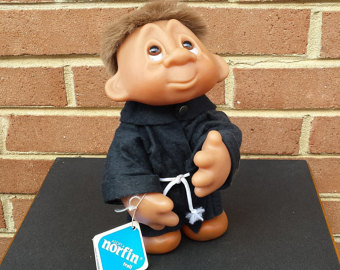
A doozie of an article from the WSJ last week, provocatively titled, “We’re All Internet Trolls (Sometimes).” The piece highlights recent research out of Stanford and Cornell on the patterns and habits of internet trolling. Like any study of taboo topics, the research has its own missing pieces, but some of the findings are, frankly, revealing:
New research by computer scientists from Stanford and Cornell universities suggests this sort of thing—a generally reasonable person writing a post or leaving a comment that includes an attack or even outright harassment—happens all the time. The most likely time for people to turn into trolls? Sunday and Monday nights, from 10 p.m. to 3 a.m…
One thing that drives people to troll is, unsurprisingly, their mood. Studies have shown that people’s moods, as revealed by the tone of their posts on Twitter, follow a remarkably predictable pattern: Relatively positive in the morning, and more negative as the day wears on. You can guess the weekly pattern: Mondays are the worst, and people seem to feel better on the weekend.
There’s an almost identical circadian rhythm for trolling, according to the research team.
These are findings that are, almost, humanizing. To notice spikes in trolling on Sunday nights and Monday mornings, to notice lulls in trolling on the weekends and Friday nights? You’d almost think that internet trolls are people too. In fact, that’s exactly what the study found:
“It’s tempting to believe that all the problems online are due to someone else, some really sociopathic person,” says Michael Bernstein, an expert in human-computer interaction at Stanford University, and one of four collaborators on the research. “Actually, we all have to own up to this.”
Die-hard internet trolls do exist and may instigate trolling in others, these researchers say. Harassment, stalking, threats of violence, psychological terrorism and serially abusive behavior online are real and must be stopped. But by focusing on the most egregious repeat offenders, internet companies have missed the forest for the trees.
A significant proportion of trolling comes from people who haven’t trolled before, the researchers say. To determine this, they analyzed 16 million comments from CNN’s website. The researchers defined trolling as swearing, harassment and personal attacks, but emphasize that trolling is defined by the community and differs from one to the next.
The article continues on to suggest a few solutions, and frankly, they’re kind of fun. One Swedish company has developed a program that makes users take a short multi-choice quiz to prove they read the article before they comment. Another app takes the user’s comment and, in the same window, compares it to two other approved comments, giving the user a chance to make edits before posting. Neither will likely roll out anytime soon on mbird.com, knock on wood. Our trolls here are very few and very far between. And yet, like bathroom stall drawings and public graffiti, “the troll we will always have with us.”
I have an extremely clear memory of the first time I was trolled on the internet. It was nineteen years ago. I was eleven years old (can you believe it?) arguing with a troll in an AOL chatroom about whether Pearl Harbor was an inside job. We fought over whether Hawaii was a state in 1941. Of course it was, wasn’t it? This was pre-Google, so I had to pull out the “H” volume of the family encyclopedia(!) to have the question answered. Turns out, Hawaii was a territory at Pearl Harbor. Who knew? I certainly didn’t. My first “rage quit” was age eleven as well.
As long as that troll is a nameless, faceless scourge, it’s easy to respond in kind, with multiple exclamation points and “shouting in ALL CAPS.” At the same time, if that troll is a person, then maybe there’s a place for sympathy. Jesus may exorcise demons by sending them off a cliff, but Mr./Mrs. Conspiracy Theory is a troll, not a demon. Which means, basically, he’s a person, no matter how much I’d prefer to view him/her in another light.
So, thanks to this research, I now know that my internet troll and I have at least four things in common. We both love weekends. We both hate Mondays. We’re both sinners, and we’re both loved by the God of the universe who created us.

COMMENTS
Leave a Reply













